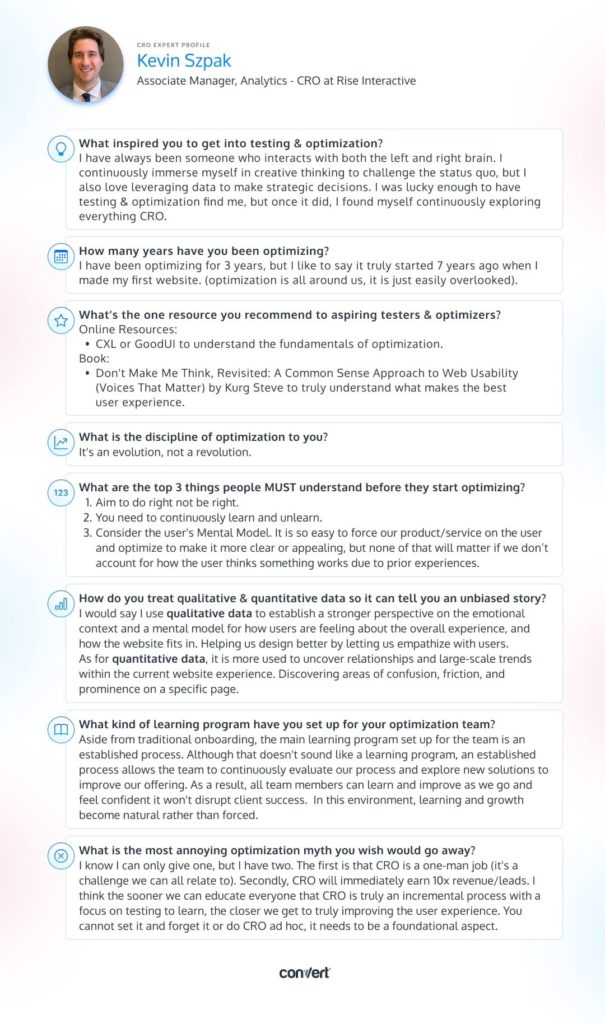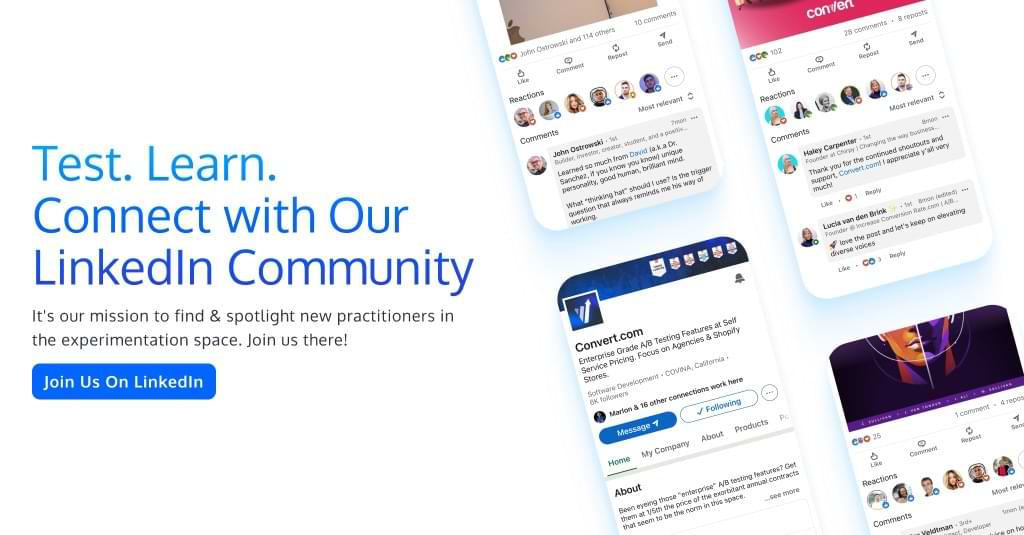Testing Mind Map Series: How to Think Like a CRO Pro (Part 24)
Interview with Kevin Szpak
If you’re looking to get into optimization, or simply want to explore the discipline further, this is the place for you.
In this interview, Kevin Szpak talked to us about the importance of taking into account the user’s mental models, unlearning what you think you know, and striving to do right instead of being right.
Kevin says it really comes down to understanding that our goal should be to take actions that will lead to the best results, not actions that we think are correct. This is a tough mindset to adopt because it requires us to let go of preconceived notions of what we think should work. But it’s necessary if we want to be successful at optimization.
So if you’re ready to challenge everything you think you know about optimization, read on. You won’t be disappointed.
Kevin, tell us about yourself. What inspired you to get into testing & optimization?
I have always been someone who interacts with both the left and right brain. I continuously immerse myself in creative thinking to challenge the status quo, but I also love leveraging data to make strategic decisions. I was lucky enough to have testing & optimization find me, but once it did, I found myself continuously exploring everything CRO.
How many years have you been optimizing?
I have been optimizing for 3 years, but I like to say it truly started 7 years ago when I made my first website. (optimization is all around us, it is just easily overlooked).
What resources do you recommend to aspiring testers & optimizers?
- Online Resources:
- CXL or GoodUI to understand the fundamentals of optimization.
- Book:
- Don’t Make Me Think, Revisited: A Common Sense Approach to Web Usability (Voices That Matter) by Steve Kurg to truly understand what makes the best user experience.
Answer in 5 words or less: What is the discipline of optimization to you?
It’s an evolution, not a revolution.
What are the top 3 things people MUST understand before they start optimizing?
- Aim to do right not be right.
- You need to continuously learn and unlearn.
- Consider the user’s Mental Model. It is so easy to force our product/service on the user and optimize to make it more clear or appealing, but none of that will matter if we don’t account for how the user thinks something works due to prior experiences.
How do you treat qualitative & quantitative data so it tells an unbiased story?
I would say I use qualitative data to establish a stronger perspective on the emotional context and a mental model for how users are feeling about the overall experience, and how the website fits in. Helping us design better by letting us empathize with users.
As for quantitative data, it is more used to uncover relationships and large-scale trends within the current website experience. Discovering areas of confusion, friction, and prominence on a specific page.
What kind of learning program have you set up for your optimization team? And why did you take this specific approach?
Aside from traditional onboarding, the main learning program set up for the team is an established process. Although that doesn’t sound like a learning program, an established process allows the team to continuously evaluate our process and explore new solutions to improve our offering. As a result, all team members can learn and improve as we go and feel confident it won’t disrupt client success. In this environment, learning and growth become natural rather than forced.
What is the most annoying optimization myth you wish would go away?
I know I can only give one, but I have two. The first is that CRO is a one-man job (it’s a challenge we can all relate to). Secondly, CRO will immediately earn 10x revenue/leads. I think the sooner we can educate everyone that CRO is truly an incremental process with a focus on testing to learn, the closer we get to truly improving the user experience. You cannot set it and forget it or do CRO ad hoc, it needs to be a foundational aspect.
Download the infographic above and add it to your swipe file for a little dose of inspiration when you’re feeling stuck!
Kevin’s insights into the world of CRO have been nothing short of refreshing and eye-opening. We hope this interview has given you some valuable insights and advice on how to experiment more effectively.
What advice resonated most with you?
Check back twice a month for upcoming interviews! And if you haven’t already, check out our past interviews with CRO legends Gursimran Gujral, Haley Carpenter, Rishi Rawat, Sina Fak, Eden Bidani, Jakub Linowski, Shiva Manjunath, Deborah O’Malley, Andra Baragan, Rich Page, Ruben de Boer, Abi Hough, Alex Birkett, John Ostrowski, Ryan Levander, Ryan Thomas, Bhavik Patel, Siobhan Solberg, Tim Mehta, Rommil Santiago, Steph Le Prevost, Nils Koppelmann, and our latest with Danielle Schwolow.
Written By
Kevin Szpak
Edited By
Carmen Apostu



